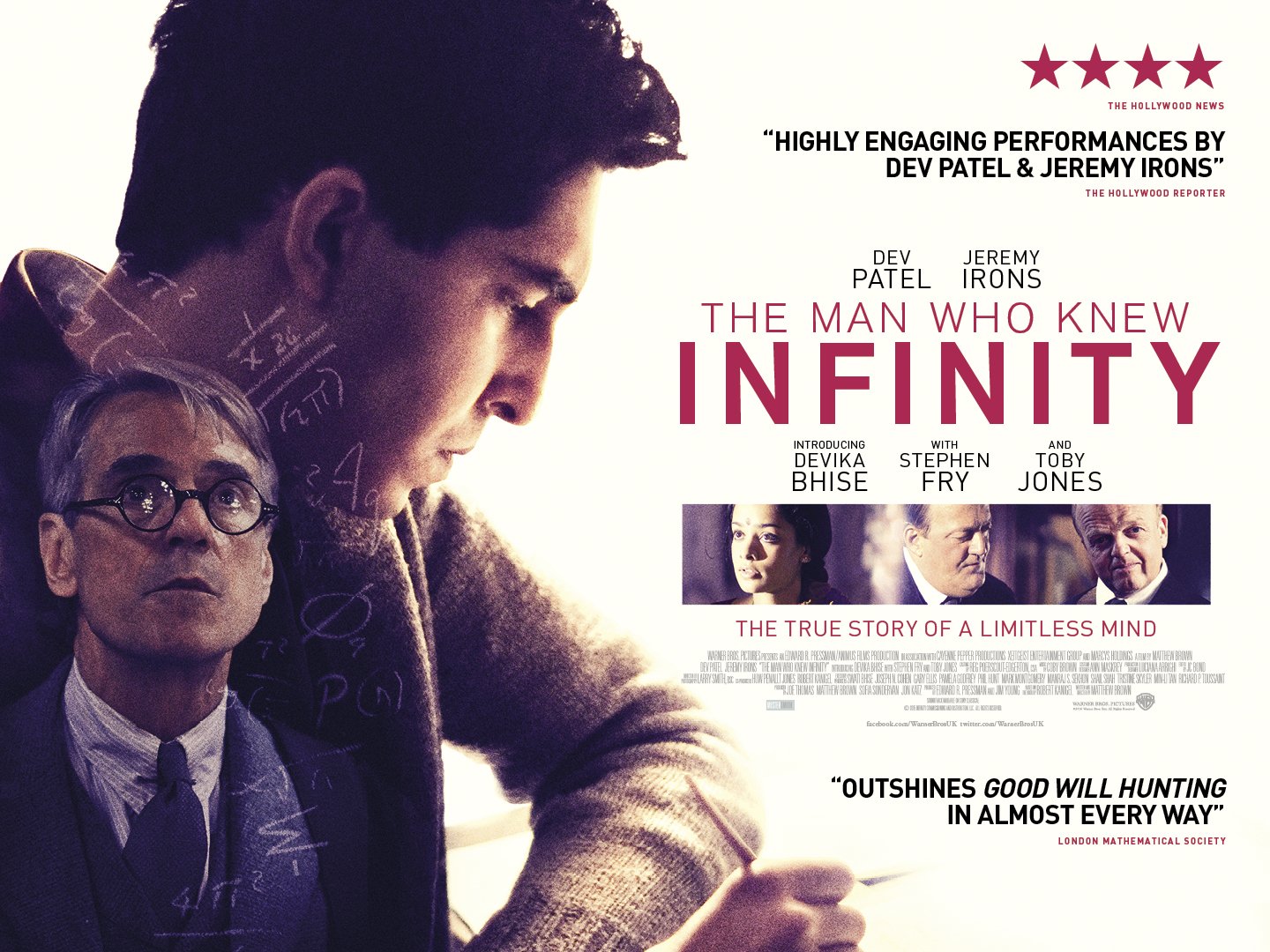zaterdag 16 juli 2016
Today's Review: The Man Who Knew Infinity
Took a while (vacation will do that), but here's a long overdue review for your approval:
The Man Who Knew Infinity - recensie
Mathematics is generally considered by mainstream audiences as a rather dull topic, but movies about mathematicians often have little trouble finding an audience. There's an odd fascination with the socially awkward minds of geniuses who spend their entire live crunching numbers, or so the success of A Beautiful Mind or more recently The Theory of Everything and The Imitation Game has proven. However, with the success of such films, there's a risk of such biopics finding themselves limited to a specific formula. A misunderstood genius+a harsh, unaccepting society+British acting talent=boxoffice success, such a formula might state. Problem is, these geniuses in question were anything but formulaic people so there ought to be a little more to it than generic writing to make modern audiences fully appreciate their work. Case in point, the legendary Srinivasa Ramanujan and the feeble The Man Who Knew Infinity.
The mathematical wonder Ramanujan was born a poor Indian with an uncanny gift for understanding numbers and dreaming up formulas way beyond the comprehension of his social environment in the early 20th Century. It took a while for his talent to be recognized and even longer for it to be put to good academic use, when he finally moved to Cambridge. There he baffled the minds of his fellows in the short years that remained to him. What made this incredible mind tick? The Man Who Knew Infinity unfortunately is more concerned with focusing on the culture of discrimination Ramanujan faced at academia. In the movie, the misunderstood genius spends most of his time being subjected to racist exclusion rather than getting any work done. And so he stays mostly misunderstood to the audience, who can't begin to comprehend just how unusual his formulas were and what grand ramifications they had for the world of mathematics. Ramanujan is just repeatedly stated to be a genius, and that's that.
Dev Patel portrays this specific genius and does an adequate job carrying the movie as such, but his talent is basically wasted as the ongoing victim of racial slurs who just keeps looking miserable and unhappy. As the genre's conventions have it, it's up to the assembled British talent to keep the movie alive beyond that. With Jeremy Irons as Ramanujan's close friend Hardy, the film does have one great card to play in keeping us interested both in Ramanujan's plight and mathematics in general. The movie is as its most interesting when Irons graces the screen, guiding us and the protagonist through the academic world and mathematical lore of the early 1900s and sharing many an intriguing anecdote about both. These scenes make for the film's most interesting moments, which are constantly hindered by Ramanujan facing yet another insult regarding his cultural roots or skin colour. We get it, racism is bad. Unfortunately, more emphasis is put on this particular message than we would care to hear. Suffering is after all a trope of the genre and worked for its predecessors: as Turing struggled with his homosexuality in The Imitation Game and Hawking with his debilitating condition in The Theroy of Everything, so Ramanujan is subjected to the racism of the day.
Which is too bad, since an unusual mind like Ramanujan's didn't deserve to be explored in such a generic period piece as The Man Who Knew Infinity. The movie carefully stays within the boundaries of the genre rather than, like the man it honours, exceeding such boundaries. It drones on endlessly about the poor man's plight rather than making us fully appreciate his work, his field of expertise and his lasting legacy. The Man Who Knew Infinity, sadly, is rather a predictable and dull movie, which hinders general moviegoers to consider mathematics something other than just that exactly. Well, at least Jeremy Irons tried...
Abonneren op:
Reacties posten (Atom)


Geen opmerkingen:
Een reactie posten